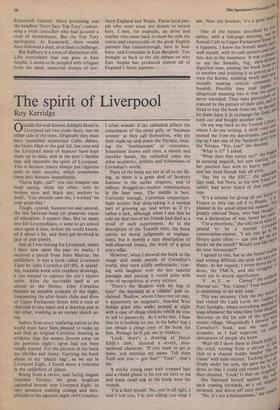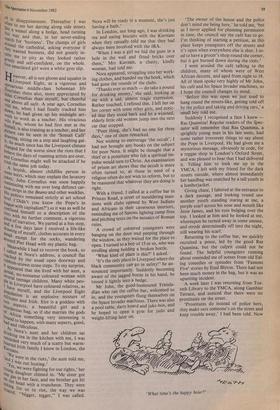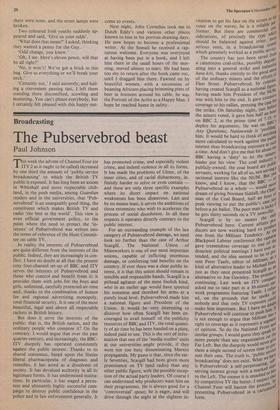The spirit of Liverpool
Roy Kerridge
Outside the well-known Ade1phi Hotel in Liverpool are two stone faces, one on either side of the steps. Originally they must have resembled mysterious Celtic deities, the Green Man or the god Jul, but time and the Liverpool sense of humour have kept them up to date, and in the port's decline they still represent the spirit of Liverpool. This is because jokers always put cigarette ends in their mouths, which transforms them into Scouses immediately.
`Gorra light, pal?' you can imagine one head saying, while the other, with its broken nose and black eye, mutters to itself, 'You shoulda seen me, I worked 'im over great-like.'
Tough, cynical, humourous and amoral, the less battered head yet preserves traces of education. 1 suspect that, like so many low-life Liverpudlians, it went to art school once upon a time, before the world knock- ed it about a bit, and there got involved in jazz or pub poetry.
Just as I was leaving for Liverpool, where I have now spent the past six weeks, I received a parcel from John Murray, the publishers. It was a book called Liverpool Eight by John Cornelius (£5.95). A sparkl- ing, readable book with excellent drawings, it too seemed to capture the city's elusive spirit. After the inevitable spell at art school in the Sixties, John Cornelius became an amiable creature of the night, frequenting the after-hours clubs and dives of Upper Parliament Street with a stick of charcoal in one hand and a drawing pad in the other, working as an instant sketch ar- tist.
Sailors from every seafaring nation in the world must have been pleased to wake up and find an original Cornelius drawing as evidence that the money thrown away on the previous night's spree had not been totally wasted. For the pictures in the book are life-like and funny. Carrying the book about in my 'plazzy bag', as we say in Liverpool Eight, I found many a welcome in the unlikeliest of places.
Rising from a ravine, and facing elegant Gambier Terrace, the great Anglican cathedral broods over Liverpool Eight, its very presence seeming strange and inex- plicable to the agnostic night owl Cornelius. I often wonder if the cathedral affects the consciences of the street girls, or 'business women' as they call themselves, who ply their trade up and down the Terrace, look- ing for 'businessmen' or customers. Sometimes drawn with eyes, a mouth and clawlike hands, the cathedral joins the other eccentrics, drifters and bohemians of Cornelius's world.
Parts of the book are not at all to my lik- ing, as there is a great deal of lavatory humour in the earlier chapters, and of tedious drugged-art-student reminiscences in the later ones. The middle is best. Curiously enough, Cornelius unquestion- ingly accepts that drug-taking is a normal part of growing up, and writes as if it's rather a lark, although when I met him he told me that two of his friends had died as a result of such experiments. As in the description of the Toxteth riots, the book carries no moral judgments or explana- tions, but is merely a racy description of well-observed events, the work of a good story-teller.
HOwever, when I showed the book to the rough and ready people of Cornelius's world, they were wildly enthusiastic, roar- ing with laughter over the less tasteful passages and passing it round pubs with cries of recognition at every picture.
`There's the Shadow with his bag of loot!' the barmaid at a villains' pub ex- claimed. Shadow, whom I have not yet met, is apparently an enigmatic, bearded West Indian giant who walks around at night with a case of cheap trinkets which he tries to sell to passers-by. As I write this, I hear that he is looking for me, in the belief that I can obtain a cheap copy of the book for him. Perhaps he'll pay me in trinkets.
`Look, there's a drawing of Dutch Eddy's club,' shouted a severe, mus- tachioed character. `If you want to get in there, just mention my name. Tell them Tush sent you — got that? "Tush", that's me.'
A stocky young man with cropped hair and a ribald gleam in his eye sat next to me and made small talk as the book went the rounds.
`I'm a thief myself. No, you're all right, I won't rob you, I'm just telling you what I
The Spectator 6 November 198" am. Now my brother, 'e's a great draw One of the haunts described by --he nelius, with a full-page drawing, was tAc Somali Café in Upper Parliament Street..T it happens, I know the Somali family fale.' well myself, with its cafe upstairs and ill re box den in the basement. It was a Pleastied. to see the Somalis, big, dark-skieg.,e dignified men, passing the book from (Tit to another and studying it as gravely were the Koran, nodding wisely and in sionally making critical comments of Swahili. Possibly they read dePths,hor allegorical meaning into it that the au'n. never intended. They were particularly of tranced by the picture of their cafe, and fered to buy the book from me. In the ell, el n
let them have it in exchange for foods ' went out and bought another one.
On my way back to the Toxteth Lehra„. where I do my writing, a shrill voice moned me from my daydreams, and rtti ing up I saw one of the 'business girls ir° the Terrace. is ace.n I d esa, sykoeu!: she shouted. ,W `What does that notice say?' ed in seeming anguish, her eyes starting her pinched face with its heavy make' and her dyed blonde hair all awrY. ble `Say No to the EEC,' the admitawas sign read, but Nora, as my new frierld,v. tion. called, had never heard of that orga'" she beSS rto 'It's a scheme for giving all our butte ex. France so they can sell it to Russia, his plained in my usual impartial manner' ht it greatly relieved Nora, who had thoug ic. was a declaration of war, hence her Pallsr `I'm a prostitute,' she told me in what col peared 'to be a normal LiveiPthe conversation-opener. 'I see you irr any
library quite often — can you get to
books on the occult? Would you like nie do your horoscoe?' and agreed writing to d itfhfiiscp,nbltusthaes ssnhoenforaun o p found read' blems. At her request, I wrote down 113, YA to dress, the YMCA, and she struggled work out its mystic significance.
'Y. er, Y. . . er . . . Camay!' deab' is something to do with soap.' blurted out. `Yes, Camay! Your horoseeir core I
This was uncanny. Only the day be st had visited the Lady Lever Art Gaireyd of Port Sunlight, where everything sme" rest soap whenever the wind blew from the glifts factories on the far side of the sprawtors model village. Misguidedly I showed into
she sud
Cornelius's book, and she went ;jog I ecstasies, as I had expected, 0° Se-
caricatures of people she knew. -Yth ss: ID
`Wait till I show them at Dutch ",at she cried, turning from a picture 0' the club to a chapter boldly headed 'oribook Game' with keen interest. Tucking the firmly under her arm, she gave me he' rod dress so that I could call round for ng?' then shouted, 'Look! Is that car stoPPI.411, She flattened herself against the " „A, neck craning forwards, as a car stoPP'" reversed, and drove off once more. „,,arE,
`No, it's not a businessman,' she re"'
ed in disappointment. Thereafter I was °Rilen to see her darting along side streets "ice a weasel along a hedge, head turning sets
way and that, in her never-ending
arch for 'business'. The clumps of girls around the cathedral, asking everyone. if they wanted business, did not greatly in- Vire me to
pity as they looked rather
greedy and self-confident, on the whole. one emaciated girl wore a white gym slip.
owever, all is not gloom and squalor in
1...1 Liverpool Eight, as a vigorous and uproarious middle-class bohemian life juourishes there also, more appreciated by °Iln Cornelius than myself, but cheerful and above all safe. A year ago, Cornelius down Me, when I had finally tracked him ,,s'Own, he had given up his midnight .art- work to work as a teacher. His vivacious Qwire Pam, whom he had first met at the '.nrriali, is also training as a teacher, and he.r, drawing, can be seen in the 'Somali Cafe 1:4,Wing, sitting on a step and laughing gai- t' So much since has the Liverpool climate b-",a,n8ed for the worse since the riots that I 4eueve the days of roaming artists are over, t11.d Cornelius might well be attacked if he ned the same job today. s A boyish, almost childlike person in some ways, which may explain the lavatory '-'4es, John Cornelius was soon happily tennniscing with me over long defunct car- aon strips in the Beano and other weeklies. rels Politics remained strictly at art school 1 vel (`Didn't you know the Pope's in :ague vvith capitalism?') so it was as well he °11fined himself to a description of the hi°ts with no further comment, a vigorous da" ece of narrative. We parted at a bus stop, raw a few days later I received a life-like c[,,-4.,1118 of myself, clothes accurate in every ar-`an except for the socks, wandering eund Pier Head with my plastic bag. I Meanwhile I had to recover the book, so r called at Nora's address, a council flat reuabekh s-st rewn .ed bY thestone steps . usual open To my surprise, doorway and eBn ' anPeared that she lived with her aunt, a i 1 Pno-nonsense coloured woman with several teenage children. Many white peo- I ehave Iniverpool have coloured relatives, as 41, myself, and the Liverpool Eight 1).niation is an explosive mixture .of tsv rleans ands Irish. Eire is a goddess with vurderous 41° asPects, a beautiful girl and a hag, so if she marries the gods b_t Africa something very interesting is bl"nnd to happen, with many aspects, good, 4c1 and ridiculous. cil.,_s . Nora's aunt and her children sat re„,111.'1118 tea in the kitchen with me, I was hmnded very much of a scatty but warm- k.arted Irish family I know in London, the iemans.
and e were in the riots,' the aunt told me, ,I,' I was out looting.' Yo „ es, we were fighting for our rights,' her tear daughter chimed in. 'Me sister got ori4r Ps in her face, and me brother got hit ask the head with a truncheon. They were Ire,itrig for us to riot, the way we was ed. "Nigger, nigger," I was called.
Nora will be ready in a moment, she's just having a bath.' In London, not long ago, I was drinking tea and eating biscuits with the Kiernans when they casually told me that they had always been involved with the IRA. `When I was a girl we hid the guns in a hole in the wall and fitted bricks over them,' Mrs Kiernan, a chatty, kindly woman, had told me. Nora appeared, struggling into her work- ing clothes, and handed me the book, which had gone the rounds of the clubs. `Thanks ever so much — do take a pound for drinking money,' she said, looking at me with a sad, almost tragic expression. Rather touched, I refused this. I left her on her corner with some other girls, and notic- ed that they stood back and let a wizened, elderly little old woman jump into the next car that stopped. `Poor thing, she's had no one for three days,' one of them remarked. Not wishing to encourage 'the occult', I had not brought any books on the subject for poor Nora. It might be thought that a thief or a prostitute who felt a spiritual im- pulse would turn to Christ. An examination of prison art shows that the occult is more often turned to, as those in need of a religion often do not wish to reform, but to be reassured that whatever they are doing is right. With a friend, I called at a coffee bar in Princes Road, a street of mouldering man- sions with clubs opened by West Indians and Africans in their cavernous interiors, reminding me of Saxons lighting camp fires and pitching tents on the mosaics of Roman ruins. A crowd of coloured youngsters were banging on the door and peeping through the window, as they waited for the place to open. I turned to a boy of 15 or so, who was strolling along holding a broken bottle. `What kind of place is this?' I asked. `It's the only place in Liverpool where the black community can go in safety!' he an- nounced importantly. Suddenly becoming aware of the jagged bottle in his hand, he tossed it lightly into a hedge. Mr John, the good-humoured Trinida- dian who ran the coffee bar, welcomed us in, and the youngsters flung themselves on the Space Invader machines. There was also a pool table, darts board and juke-box, and he hoped to open a gym for judo and weight-lifting later on. `The owner of the house and the police don't mind me being here,' he told me, tut as I never applied for planning permission in time, the council say the cafe has to go. I'm thinking of starting a petition, as this place keeps youngsters off the streets and it's open when everywhere else is shut. I us- ed to have a grocer's shop round the corner, but it got burned down during the riots.'
I went around the café talking to the children, many of whom were of West African descent, and aged from eight to 18. All of them spoke very highly of Mr John, his café and his Space Invader machines, so I hope the council changes its mind.
`Before this was open we just used to hang round the streets-like, getting told off by the police and taking and driving cars,' a small boy told me.
Suddenly I recognised a face I knew Ras Quamina! Regular readers of the Spec- tator will remember that Ras Quamina, a
sprightly young man in his late teens, had some rather irreverent things to say about the Pope in Liverpool. He had given me a mysterious message, obviously in code, for a reggae shop in London's Oxford Street, and was pleased to hear that I had delivered it. Telling him to look me up in the YMCA, I left with my friend for the dark streets outside, where almost immediately her handbag was snatched by a tall youth in a lumberjacket.
Giving chase, I faltered at the entrance to a dark passage, and looking round saw another youth standing staring at me, a purple scarf across his nose and mouth like Jesse James, and his eyes bulging over the top. I looked at him and he looked at me, whereupon he turned away in some unease, and strode determinedly off into the night, still wearing his scarf.
Returning to the coffee bar, we quickly recruited a posse, led by the good Ras Quamina, but the culprit could not be found. The helpful youngsters running about reminded me of scenes from old Eal- ing comedies or episodes from 'Famous Five' stories by Enid Blyton. There had not been much money in the bag, but it was an upsetting incident. A week later I was returning from Tox- teth Library to the YMCA, along Gambier Terrace,. and noticed that there were no prostitutes on the street.
`Prostitutes do instead of police here, they make sure someone's, on the street and keep trouble away,' I had been told. Now `What time's the happy hour?' there were none, and the street lamps were broken.
Two coloured Irish youths suddenly ap- peared and said, 'Give us your odds'.
`What does that mean?' I asked, thinking they wanted a penny for the Guy.
`Odd change, you know.'
`Oh, I see. Here's eleven pence, will that be all right?'
`No, it won't! We've got a brick in this bag. Give us everything or we'll break your neck.'
`Certainly not,' I said austerely; and hail- ing a convenient passing taxi, I left them standing there discomfited, scowling and muttering. You can't please everybody, but I certainly felt pleased with this happy out- come to events.
Next night, John Cornelius took me to Dutch Eddy's and various other places known to him in his portrait-drawing days. He now hopes to become a professional writer. At the Somali he received a rap- turous welcome. Everyone was overjoyed at having been put in a book, and I left him there in the small hours of the mor- ning, moved almost to tears. He had been too shy to return after the book came out, until I dragged him there. Fawned on by beautiful women, with a succession of beaming Africans placing brimming pints of beer in festoons around his table, he was the Portrait of the Artist as a Happy Man. I hope he reached home in safety.
















































 Previous page
Previous page